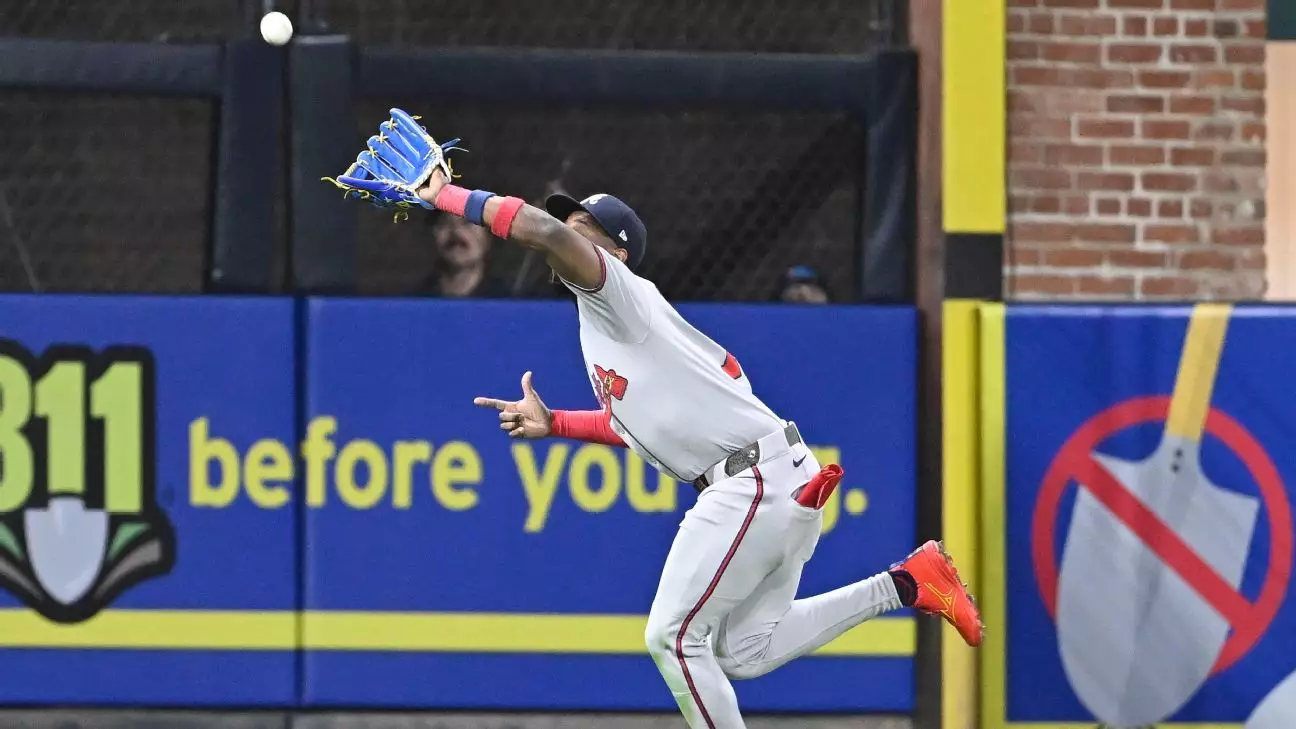In a revelation that reverberates deeply throughout Major League Baseball, Atlanta Braves outfielder Jurickson Profar finds himself ensnared in a web of controversy following a positive test for a banned substance. This pivotal moment—a stark reminder of the ongoing battle against performance-enhancing drugs (PEDs)—has sent shockwaves through the baseball community. Profar’s impending 80-game suspension, set to commence at the start of a crucial series against the Los Angeles Dodgers, starkly illuminates the tension between personal ambition and the integrity of the sport.
Profar’s choice, however mistaken, conjures the image of a player on the brink of something monumental—a journey from being a celebrated athlete to the label of a cheater. His contract with the Braves, a hefty three-year deal worth $42 million, was a testament to his perceived potential. Yet, it now hangs in the balance, exposing the fragility of a career often built on the precarious grounds of public trust and scrutiny.
The Psychological Toll of Accusation
One must reflect on the psychological burden such a bombshell brings not only to the individual but to the entire organization. Profar’s heartfelt statement, declaring this as “the most difficult day of my baseball career,” provides a glimpse into the emotional chaos experienced by athletes navigating a high-pressure environment. His assertion of “devastation” resonates; it’s a palpable pain that extends beyond mere disappointment in one’s performance—it’s about identity, legacy, and self-worth.
This incident pulls back the curtain on the personal stakes involved in professional athletics. Players like Profar are more than just statistics or offensive lineups; they are human beings grappling with the weight of their decisions. A history marred by scrutiny and PR disasters places an inordinate amount of pressure on athletes, who may resort to desperate measures in pursuit of excellence, even if those measures lead to shame.
A Fractured Team Dynamic
The ramifications of Profar’s suspension extend beyond the individual; they fracture the fabric of team dynamics. The Braves, already struggling in the early season, suffered a humiliating sweep at the hands of the San Diego Padres, delivering a cruel reminder of how one player’s misstep can cascade into larger challenges for a collective. Without Profar and the injured Ronald Acuña Jr., a key player in the lineup, the Braves must reconfigure their strategy in a critical moment that could define their season.
This lack of depth stalls the momentum for a team eager to reclaim its stature in a competitive league. The acquisition of minor league players and the scramble to fill gaps signals a desperation that not only undermines performance but risks alienating the fanbase. Trust and loyalty—the very components that fuel enthusiasm for the team—may begin to erode when the spotlight shines on disappointing outcomes.
The Broader Implications of the PED Crisis
Profar’s case also finds its roots in a broader conversation about the ethics of sports in the age of advancement and scrutiny. The existence of substances like chorionic gonadotropin (hCG), which purportedly enhances performance by stimulating testosterone production, adds complexity to an already murky debate about what athletes are willing to sacrifice in the name of legacy. It is vital to confront the uncomfortable truth that sometimes the pursuit of glory clouds judgment, leading players to tread dangerous paths, often with devastating consequences.
As the MLB continues to enforce strict measures to combat doping, individuals like Profar underscore a sad reality: the balance of the game is increasingly compromised by personal choices driven by ambition and desire for validation. In an environment where statistics and accolades define a player’s legacy, how far is one willing to go to secure that legacy, particularly when the stakes—both personally and professionally—are so high?
Ultimately, Profar’s misjudgment serves as a microcosm of a flawed system that places extraordinary expectations on athletes. It compels us, as spectators and fans, to reflect on the human element that underlies the statistics we worship. Rather than casting him aside as another casualty of the PED epidemic, we should grapple with the question of how we can cultivate an environment that not only promotes excellence but also cherishes ethics and integrity within the sport.


Leave a Reply